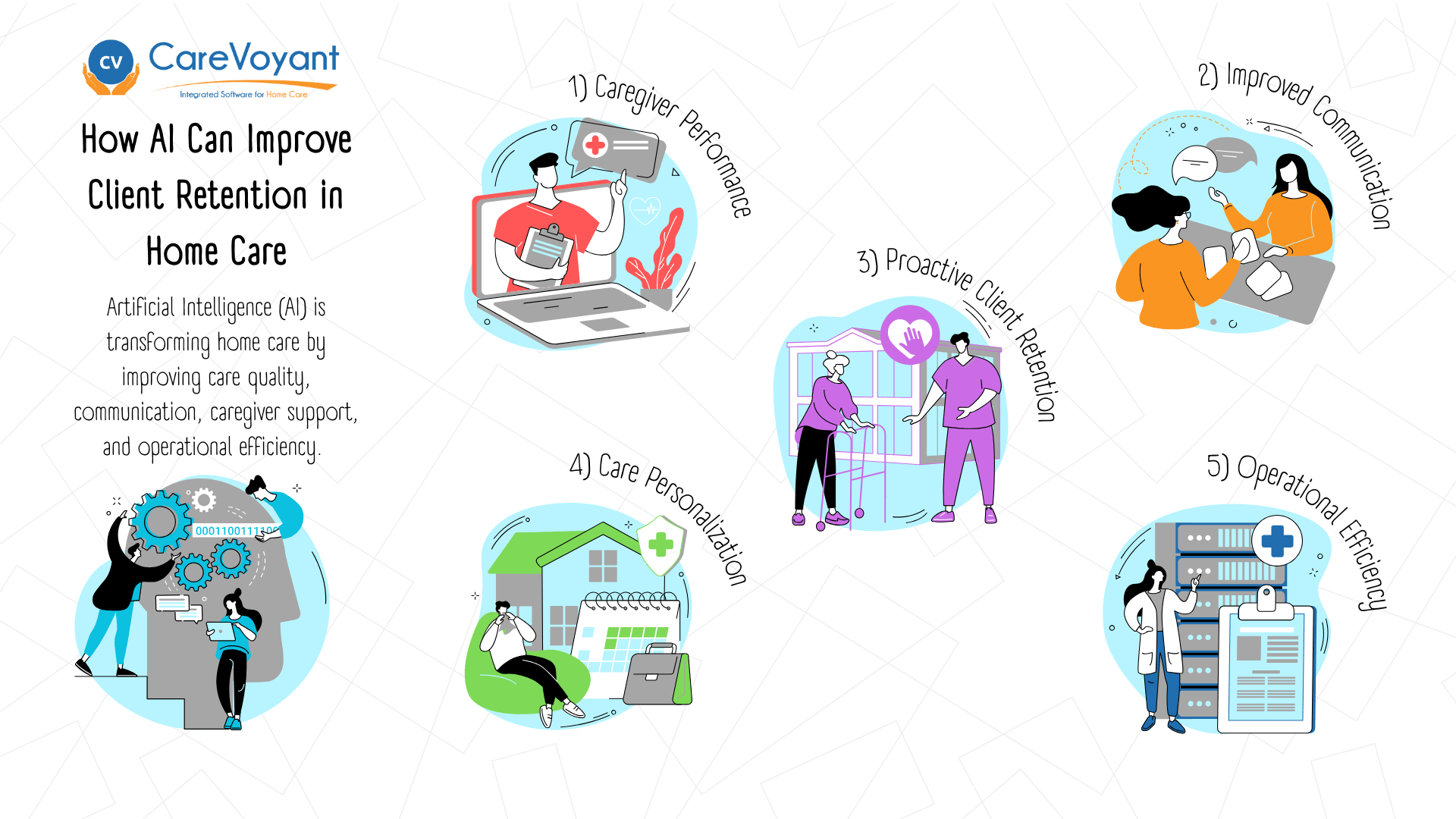Discover how AI-powered solutions can enhance client retention in home care. Learn about predictive analytics, caregiver matching, and automation to improve care quality and boost satisfaction!
Introduction
Retaining clients in home care is a constant challenge. High turnover rates stem from inconsistent care quality, poor communication, and caregiver burnout—leading to lost revenue and disrupted care. This instability not only affects business profitability but also diminishes trust and patient outcomes.
AI offers a game-changing solution. Using predictive analytics, automated engagement, and personalized care strategies, AI can enhance both caregiver and client satisfaction. According to the McKinsey report, AI-driven automation can reduce administrative burden by up to 30%, allowing caregivers to focus more on patient care. But can AI truly transform retention? Let’s explore how technology is reshaping home care.
Understanding Client Retention in Home Care
Client retention is a critical factor to the success of home care agencies. High retention rates indicate satisfied clients, a well-functioning care model, and a stable revenue cycle. However, many agencies struggle with maintaining long-term client relationships due to several key factors.
Key Factors Affecting Client Retention
Care Quality – Clients expect consistent, compassionate, and skilled care. Any lapse in service quality can quickly lead to frustration and loss of confidence.
Communication – Clear, timely communication between clients, caregivers, and agencies fosters trust and prevents misunderstandings.
Client Satisfaction – Personalized care, responsiveness to concerns, and emotional connection helps clients feel like valued individuals rather than just another number.
Caregiver Stability – Frequent caregiver turnover disrupts continuity of care, making clients feel uneasy and undervalued.
Operational Efficiency – Smooth scheduling, accurate billing, and seamless care coordination prevent frustration and financial uncertainty for families.
The Financial and Operational Impact of Poor Retention
Client turnover directly affects an agency’s bottom line. Acquiring new clients is costly and time-consuming, involving marketing, assessments, and onboarding. Frequent turnover disrupts operational efficiency, leading to increased administrative workload and decreased caregiver morale. Moreover, home care agencies must consider word-of-mouth referrals: a reputation for poor care continuity makes attracting new clients even more challenging. Improving retention is not just about keeping clients—it is about building a sustainable, trusted, and high-quality home care service.
How AI Can Enhance Client Retention in Home Care
Artificial Intelligence (AI) is transforming home care by improving care quality, communication, caregiver support, and operational efficiency. By leveraging AI-driven tools, agencies can predict and prevent client dissatisfaction and streamline administrative processes. Predictive analytics can help agencies anticipate potential drop-offs in service.
AI-Driven Personalization of Care
Personalized care is key to client satisfaction and long-term retention. AI enhances this by:
Predictive analytics for personalized care plans – AI can analyze client health data to recommend tailored care plans that adapt to changing needs.
AI-powered caregiver matching to improve compatibility – AI algorithms can assess caregiver skills, preferences, and schedules to match them with clients for better rapport.
Monitoring and adapting care plans based on real-time data – AI-driven remote monitoring can alert caregivers and agencies to necessary adjustments, ensuring proactive care.
Improved Communication & Engagement
Communication gaps can lead to dissatisfaction and turnover. AI improves engagement through:
AI chatbots and virtual assistants for 24/7 support – Clients and families can get instant responses to basic queries, improving care timeliness and accessibility.
Automated reminders for medications and appointments – AI can help clients stay on track with care requirements, reducing hospitalizations and further health repercussions.
Communication analysis to detect client dissatisfaction early – AI can scan messages and feedback to identify negative sentiments, allowing agencies to address concerns proactively.
Predictive Analytics for Proactive Client Retention
AI can prevent client loss by identifying and resolving issues before they escalate:
Identifying early warning signs of dissatisfaction – AI can detect patterns in feedback, care requests, and service utilization that indicate a risk of client departure.
AI-driven insights to prevent client drop-off – AI can analyze historical data to recommend retention strategies tailored to specific client concerns.
Data-driven recommendations for care improvements – AI can continuously assess client feedback and health data to suggest care plan optimizations.
Enhanced Caregiver Performance & Satisfaction
Caregiver satisfaction directly impacts client retention. AI helps by:
AI-based scheduling for reduced caregiver burnout – AI can optimize schedules to balance workload and prevent fatigue.
Performance tracking and feedback mechanisms – AI can provide real-time insights into caregiver performance, enabling targeted coaching and support.
AI-driven training recommendations for caregiver skill enhancement – AI can identify gaps in skills and suggests personalized training programs.
Operational Efficiency & Service Quality
Seamless operations ensure a positive client experience. AI optimizes processes through:
AI-powered documentation and compliance tracking – AI can automate paperwork, ensuring accurate records and regulatory compliance.
Automated billing and invoicing for seamless client experience – AI can minimize errors and delays, enhancing financial transparency and client trust.
AI-driven quality assurance and feedback loops – AI can analyze performance data to identify areas for improvement.
Challenges & Considerations in AI Implementation
While AI offers significant benefits in improving client retention in home care, its implementation comes with challenges that agencies must carefully navigate. Understanding these obstacles is essential for integrating AI without compromising care quality.
Data Privacy and Security Concerns
AI systems rely on vast amounts of sensitive client data, including medical records, caregiver schedules, and personal preferences. Protecting this data from breaches, unauthorized access, or misuse is top priority. Home care agencies must:
Ensure AI platforms comply with HIPAA and other relevant data protection regulations.
Use encrypted storage and secure access controls to safeguard client information.
Educate staff on cybersecurity best practices to prevent data leaks.
Integration with Existing Home Care Management Systems
Implementing AI tools requires seamless integration with existing home care management system to avoid workflow disruptions. Key considerations:
Choosing AI solutions that offer API compatibility with existing systems.
Ensuring AI tools enhance, rather than complicate, caregiver workflows.
Providing training for staff to use AI-driven insights effectively.
Balancing AI Automation with Human Touch
Home care remains a deeply human-centred service. Over-reliance on automation can lead to a loss of personal connection, which is essential for client trust and satisfaction. Agencies should:
Use AI to enhance—not replace—human interactions in care delivery.
Maintain direct client communication through caregivers and care managers.
Regularly review AI-driven decisions to ensure they align with individual client needs and emotional well-being.
By addressing these challenges proactively, home care agencies can leverage AI’s benefits to improve upon high-quality, compassionate care that strengthens client relationships.
Future Trends: The Role of AI in Evolving Client Retention Strategies
As AI continues to advance, home care agencies must stay ahead of emerging trends to enhance client retention. AI’s evolving capabilities can help agencies maintain strong client relationships and long-term loyalty.
Emerging AI Technologies in Home Care
Several innovative AI-driven technologies are shaping the future of home care:
AI-Powered Virtual Companions – Smart voice assistants that provide social interaction, reminders, and emotional support for clients.
Remote Health Monitoring with AI Analytics – Wearable devices and smart home sensors that track vital signs, detect falls, and alert caregivers in real time.
Advanced Natural Language Processing (NLP) for Sentiment Analysis – AI tools that analyze client feedback, phone calls, and messages to detect dissatisfaction before it escalates.
Automated Care Coordination – AI platforms that optimize scheduling, caregiver assignments, and care plans based on real-time data.
Predictions for AI Adoption in Home Care
Mainstream AI Integration by 2030 – AI-driven care solutions will become a standard in home care, helping agencies proactively manage client needs.
Widespread Use of Predictive Analytics – AI will provide deeper insights into health trends, allowing for early interventions and better long-term care planning.
AI-Powered Family Engagement – AI will facilitate real-time updates and personalized reports to keep family members informed about their loved ones’ care.
Greater Customization of AI Solutions – Agencies will have more tailored AI tools that align with specific client demographics and preferences.
Frequently Asked Questions
-
AI enhances client retention by improving care quality, personalizing care plans, and streamlining operations. AI-driven predictive analytics can identify dissatisfaction early, while automated scheduling and caregiver matching boost service consistency.
-
Client retention depends on care quality, effective communication, caregiver stability, client satisfaction, and operational efficiency. AI can help address these challenges by improving care coordination, reducing administrative burdens, and ensuring personalized care.
-
AI algorithms assess caregiver skills, availability, and client preferences to create better matches. This enhances compatibility, reduces turnover, and strengthens the caregiver-client relationship, leading to higher satisfaction and improved retention.
-
Predictive analytics identify early warning signs of dissatisfaction by analyzing client feedback, health data, and engagement trends. Agencies can use these insights to take proactive steps in preventing service drop-offs and improving client experiences.
-
Yes, AI optimizes scheduling to prevent caregiver fatigue, provides performance tracking for better workload management, and offers personalized training recommendations. By reducing administrative tasks, AI allows caregivers to focus on quality care.
-
AI-powered virtual assistants, automated appointment reminders, and sentiment analysis tools help agencies maintain clear, timely, and responsive communication. This enhances trust and reduces client frustration.
-
Challenges include ensuring data security and compliance with HIPAA regulations, integrating AI with existing home care system, and maintaining a balance between automation and human touch in caregiving.
-
AI automates scheduling, billing, compliance tracking, and documentation, reducing errors and administrative workloads. This leads to a more seamless client experience and improved service reliability.
-
AI-powered virtual companions, remote health monitoring, advanced sentiment analysis, and automated care coordination are revolutionizing home care, enhancing client engagement, and improving retention rates.
-
While AI enhances efficiency, home care remains a deeply personal service. Maintaining human connections through direct communication, personalized interactions, and emotional support ensures that AI complements rather than replaces compassionate caregiving.
Conclusion
AI is revolutionizing client retention in home care by enhancing personalized care, improving communication, and optimizing caregiver support. By leveraging AI-driven tools such as predictive analytics, virtual assistants, and automated scheduling, agencies can proactively address client needs, detect dissatisfaction, and help agencies improve service quality.
Key Takeaways for Home Care Providers
AI enhances client satisfaction by personalizing care plans and improving caregiver-client compatibility.
Predictive analytics help identify early warning signs of dissatisfaction, allowing agencies to take proactive action.
AI-powered communication tools keep clients engaged and informed, reducing frustration and improving trust.
Automation in operations improves efficiency in scheduling, compliance, and billing, creating a seamless client experience.
Balancing AI with human touch is essential to maintaining the emotional connection that clients value in home care.
As AI technology continues to evolve, home care providers that adopt innovative solutions will gain a competitive edge, improve retention rates, and deliver higher-quality care. The future of home care lies in the smart integration of AI with compassionate caregiving.
About CareVoyant
CareVoyant is a leading provider of cloud-based integrated enterprise-scale home health care software that can support all home-based services under ONE Software, ONE Patient, and ONE Employee, making it a Single System of Record. We support all home based services, including Home Care, Private Duty Nursing, Private Duty Non-Medical, Home and Community Based Services (HCBS), Home Health, Pediatric Home Care, and Outpatient Therapy at Home.
CareVoyant functions – Intake, Authorization Management, Scheduling, Clinical with Mobile options, eMAR/eTAR, Electronic Visit Verification (EVV), Billing/AR, Secure Messaging, Notification, Reporting, and Dashboards – streamline workflow, meet regulatory requirements, improve quality of care, optimize reimbursement, improve operational efficiency and agency bottom line.
For more information, please visit CareVoyant.com or call us at 1-888-463-6797.
Request for Information
To learn more about CareVoyant Software and how we improve the operational efficiency of Home Healthcare Agencies, contact us:





